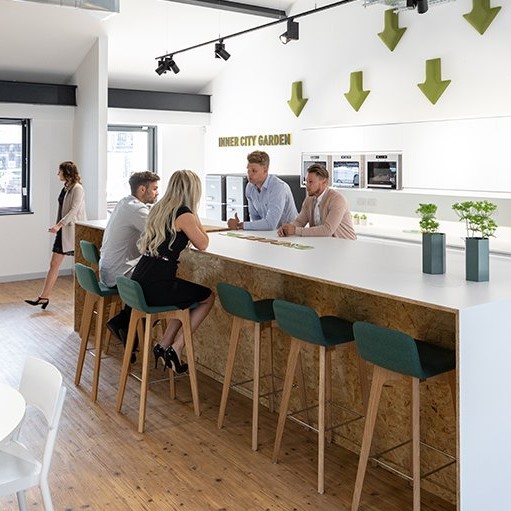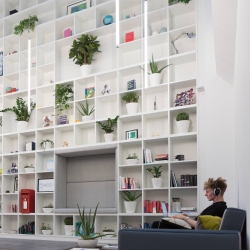To provide the best experiences, we use technologies like cookies to store and/or access device information. Consenting to these technologies will allow us to process data such as browsing behaviour or unique IDs on this site. Not consenting or withdrawing consent, may adversely affect certain features and functions.
The technical storage or access is strictly necessary for the legitimate purpose of enabling the use of a specific service explicitly requested by the subscriber or user, or for the sole purpose of carrying out the transmission of a communication over an electronic communications network.
The technical storage or access is necessary for the legitimate purpose of storing preferences that are not requested by the subscriber or user.
The technical storage or access that is used exclusively for statistical purposes.
The technical storage or access that is used exclusively for anonymous statistical purposes. Without a subpoena, voluntary compliance on the part of your Internet Service Provider, or additional records from a third party, information stored or retrieved for this purpose alone cannot usually be used to identify you.
The technical storage or access is required to create user profiles to send advertising, or to track the user on a website or across several websites for similar marketing purposes.
 According to a Kaspersky survey of 4,303 IT workers, 56 percent of employees have reported an increased workload since switching to remote working, with 19 percent describing the increase as significant. 40 percent did not notice a change in volume, and only 9 percent noted a decrease in the scope of work due to new working conditions. More →
According to a Kaspersky survey of 4,303 IT workers, 56 percent of employees have reported an increased workload since switching to remote working, with 19 percent describing the increase as significant. 40 percent did not notice a change in volume, and only 9 percent noted a decrease in the scope of work due to new working conditions. More →





 Three-quarters of tech leaders think Gen Z will solve the digital skills shortage (72 percent), with an even higher number (77 percent) believing these ‘digital-natives’ have the best ability of any generation. However, while half of Gen Z have a career in tech or firm plans to pursue one in the next five years (46 percent), they have low confidence in their digital abilities.
Three-quarters of tech leaders think Gen Z will solve the digital skills shortage (72 percent), with an even higher number (77 percent) believing these ‘digital-natives’ have the best ability of any generation. However, while half of Gen Z have a career in tech or firm plans to pursue one in the next five years (46 percent), they have low confidence in their digital abilities. 
 Nearly two thirds (61 percent) of HR and people professionals strengthened their skills – through either upskilling or reskilling – as a result of their organisation’s response to the COVID-19 pandemic, the latest People Profession survey report from the
Nearly two thirds (61 percent) of HR and people professionals strengthened their skills – through either upskilling or reskilling – as a result of their organisation’s response to the COVID-19 pandemic, the latest People Profession survey report from the 
 Employee experience has never been so high on the corporate agenda; with recent figures finding
Employee experience has never been so high on the corporate agenda; with recent figures finding 
 According to new research from
According to new research from 
 According to new research by the
According to new research by the 
 Research from
Research from 
 According to
According to 
 I recently stumbled upon the phrase epistemic trespass, which describes the phenomenon of people making judgements in fields in which they have no expertise. I came across it as it was used to explain the sudden explosion of opinions about Afghanistan from a hitherto unknown horde of experts. Which may or may not be the same horde that has been so very certain about immunology and public health during the pandemic. It’s an old idea and one that needs to be treated with care, for reasons set out by Noah Smith
I recently stumbled upon the phrase epistemic trespass, which describes the phenomenon of people making judgements in fields in which they have no expertise. I came across it as it was used to explain the sudden explosion of opinions about Afghanistan from a hitherto unknown horde of experts. Which may or may not be the same horde that has been so very certain about immunology and public health during the pandemic. It’s an old idea and one that needs to be treated with care, for reasons set out by Noah Smith 
 As businesses in the UK prepare to open their office doors en masse in the first week of September, new research reveals that office workers have got that back-to-school excitement and are feeling largely positive about the transition. Recruitment firm Michael Page questioned over 2,000 UK office workers on their attitudes to returning to the office and found that after eighteen months at home, around half claim to be ‘excited’ or ‘happy’ to spend more time in the office with their colleagues. Reminiscent of the first day back at school, almost three in ten (28 percent) said that they had picked out their outfit and packed their bag ahead of their first day back in the office.
As businesses in the UK prepare to open their office doors en masse in the first week of September, new research reveals that office workers have got that back-to-school excitement and are feeling largely positive about the transition. Recruitment firm Michael Page questioned over 2,000 UK office workers on their attitudes to returning to the office and found that after eighteen months at home, around half claim to be ‘excited’ or ‘happy’ to spend more time in the office with their colleagues. Reminiscent of the first day back at school, almost three in ten (28 percent) said that they had picked out their outfit and packed their bag ahead of their first day back in the office. 
 CEOs of the world’s largest businesses are increasingly optimistic about the outlook for their own business, according to the latest
CEOs of the world’s largest businesses are increasingly optimistic about the outlook for their own business, according to the latest 









November 1, 2021
The modern workplace is defined as much by digital space as the physical office
by Wilco Wijnbergen • Comment, Property, Technology